This article was originally published on the Council of Canadians website, and is republished here with Robin Tress’ kind permission. Check out more of Robin’s writing here.

KJIPUKTUK (Halifax) – The Alton Gas project is a proposal to store extremely high pressure natural gas in underground salt caverns. To create these caverns the company would drill wells into the salt deposit and dissolve the salt with water from the Shubenacadie River. The resulting brine would be about eight times saltier than seawater and would be piped back into the river, which is home to Striped bass and many other fish. For years, grassroots Mi’kmaq rights holders have opposed this project in their community and in court.
The Alton Gas project is an example of the profit-at-all-costs mentality of our current economy. Mi’kmaq rights holders have never given their consent for this project, and have led the sustained effort to stop it for six years. The lack of Indigenous consent and a list of well-documented dangers has fuelled an effective resistance to this project. Alton Gas is a fossil fuel storage project that would expand the network of natural gas infrastructure in Atlantic Canada precisely at the time we need to ramp down all fossil fuel use. And yet, this project is barreling forward.
The Council of Canadians helped release new documents, obtained thanks to the tireless work of grassroots researchers, that show the federal government knows this project would break the law and harm the fish in the river. Rather than challenge the company to meet the standard of the law, the federal government has chosen to pursue new regulations under the Fisheries Act to accommodate AltaGas, the corporation behind the project.
This is a critical time to build on the existing resistance movement and stop this project completely. This blog details the information we received through Freedom of Information requests, and how this can help us stop Alton Gas for good.
Feds know Alton Gas would harm fish, violate Fisheries Act
Through Freedom of Information requests we have learned that as early as 2016, Environment and Climate Change Canada (ECCC), the federal department responsible for the Fisheries Act, knew that the high-concentration brine Alton Gas would dump into the Shubenacadie River would be “considered deleterious substances according to the Fisheries Act.” The word “deleterious” means harmful or bad.
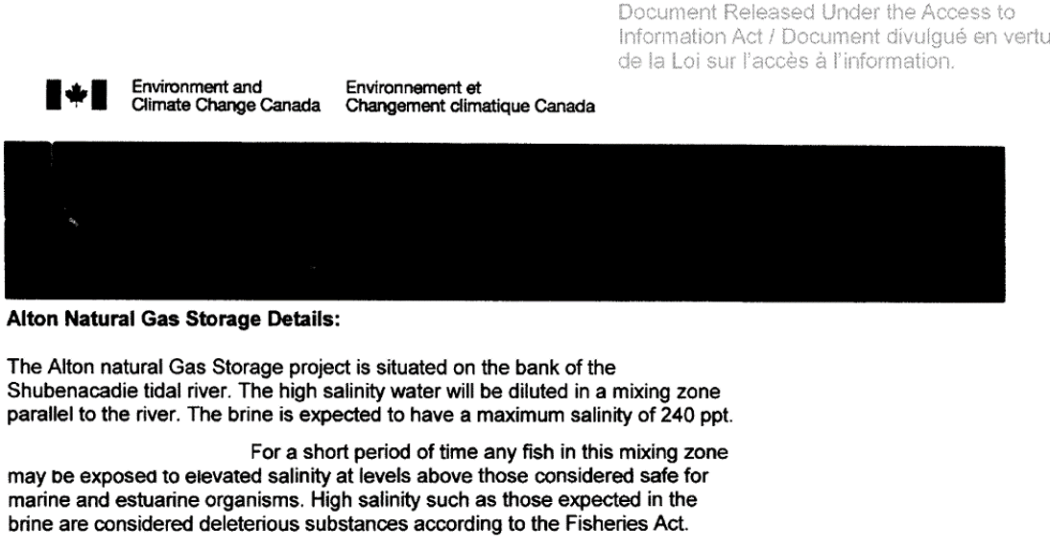
Under these circumstances, the conditions of Nova Scotia Environment’s (NSE) original approval of Alton Gas are not being met and it is within NSE’s mandate and responsibility to withdraw the permits for this project.
Section 36(3) of the Fisheries Act requires that “no person shall deposit or permit the deposit of a deleterious substance of any type in water frequented by fish or in any place under any conditions where the deleterious substance or any other deleterious substance that results from the deposit of the deleterious substance may enter any such water.”
The toxicology report referred to above clearly states that “high salinity such as those expected in the brine are considered deleterious substances according to the Fisheries Act.” The Fisheries Act says that no one is allowed to put a deleterious (harmful or bad) substance into water home to fish. There have been no changes to the company’s brine disposal plan since this toxicology report was written in 2016.
Provincial permits should be cancelled
Nova Scotia Environment (NSE) approved the Alton Gas project’s environmental assessment in 2007. One of the many conditions of this approval is that the company must monitor the salinity levels to ensure no negative impacts to fish, and that this should be developed with Environment Canada (now called Environment and Climate Change Canada). The toxicology report from ECCC clearly shows that the federal government knows the brine would have negative impacts on fish, and so this project would not meet this critical condition of its approvals.
NSE has also granted Alton Gas an “Industrial Approval” that is conditional on the project following all federal, provincial, and municipal laws. By violating the Fisheries Act, this condition would be broken.
This project is not living up to the conditions of its various provincial government approvals. It is the responsibility of the province to ensure that the company is held to account, for example by cancelling the permits.
Alton Gas trying to change the Fisheries Act
In 2017, AltaGas met with ECCC officials “to present a variety of options that could allow them to operate while meeting their obligations under the Fisheries Act.”
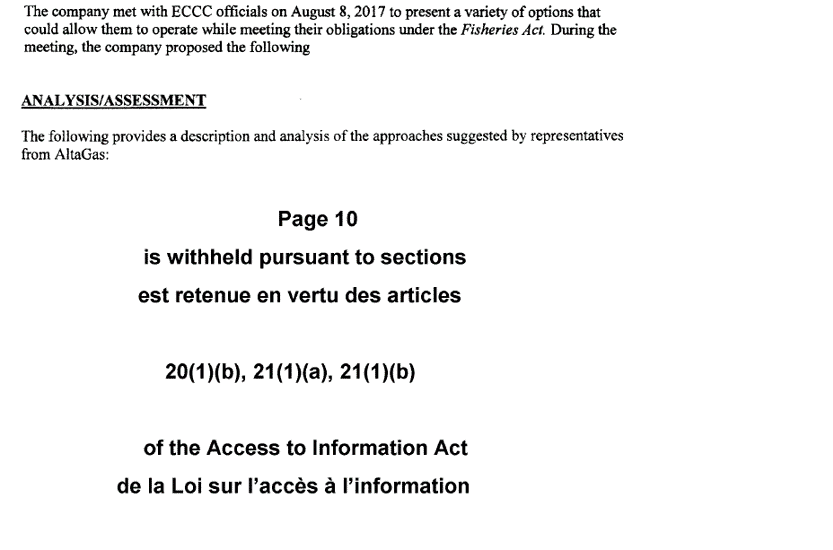
We received a heavily redacted version of this memo, so we don’t know exactly what the company suggested as alternatives. However, we do know that in the year following the meeting described in this memo, AltaGas lobbied Environment and Climate Change Canada 22 times about this project.
Then in 2019, ECCC issued a notice of intent to create new regulations under the Fisheries Act that would allow the Alton Gas project to dump its brine into the Shubenacadie River, despite the fact that ECCC scientists declared the high-salinity brine “deleterious,” or harmful. It is important to recognize that changing the law would not change the harmful nature of this salt to the river and the fish within it.
We see the notice of intent as an acknowledgement that the project as it stands right now is not in alignment with the Fisheries Act, and in order for it to be compliant with the law, the federal government has chosen to change the law rather than hold the company accountable.
This is the first time, to my knowledge, that Fisheries Act regulations have been made to specifically permit a project. Regulations usually pertain to entire industrial activities. This is a very dangerous precedent to set.
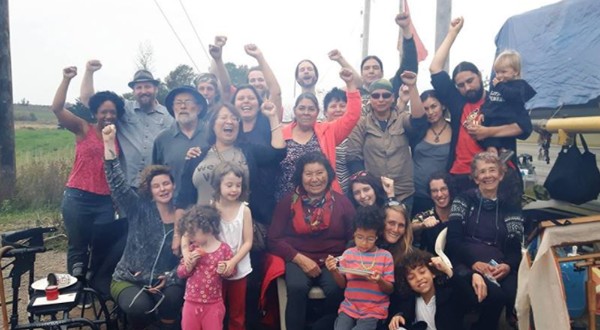
Alton Gas and corporate capture
The term “corporate capture” refers to the ways corporate entities undermine democracy, human rights, and environmental stewardship by influencing public institutions, including governments. AltaGas has had an undue level of influence on ECCC and one of Canada’s primary environmental laws, the Fisheries Act. Both ECCC and Nova Scotia Environment have known for years that the Alton Gas project would produce “deleterious” or harmful substances, and have failed to bring this project into compliance with the Fisheries Act. Both levels of government are continuing to support the Alton Gas project despite the failures and shortcomings that the Council of Canadians and others have continuously pointed out, and we see this inability or unwillingness to hold corporations to account as a serious threat to our democracy as a whole.
Alton Gas and the climate crisis
We are in a global climate crisis driven by capitalist economic structures, colonization of Indigenous lands, and the exploitation of people here and around the world. Alton Gas is a fossil fuel infrastructure project, and the parent company, AltaGas, is a fossil fuel giant that builds and operates LNG and other gas projects across North America. Allowing Alton Gas to be built, and this corporation to have undue influence over our governments, is pushing Canada further down the road that we know is leading us to disaster.
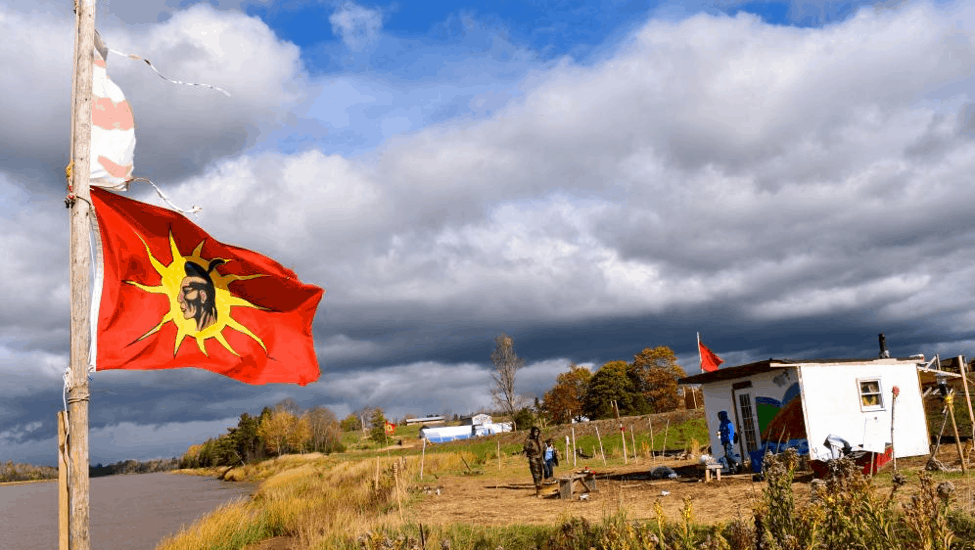
Alton Gas and Indigenous Rights
The Mi’kmaq Nation, on whose land the project is proposed to take place, has never consented to this project. The Mi’kmaq have constitutionally-protected treaty rights to fish in the Shubenacadie River.
“This is evidence that the federal government knows this project would harm fish,” said grassroots grandmother and water protector Darlene Gilbert. “There’s no way around it – a harm to fish is a harm to the treaty right to fish.”
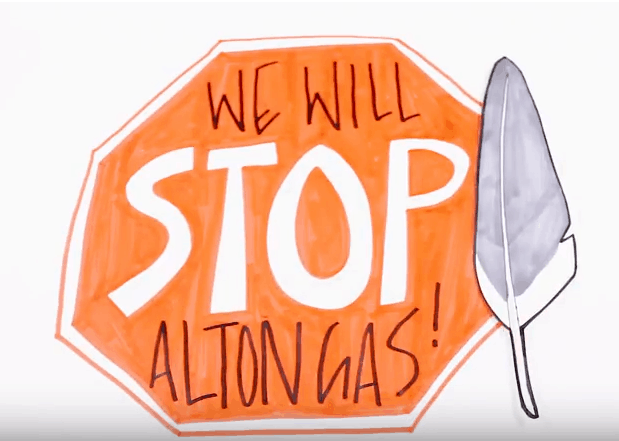
See also: Dale Andrew Poulette and Rachael Greenland-Smith: The fight to save the Shubenacadie River
With a special thanks to our generous donors who make publication of the Nova Scotia Advocate possible.
Subscribe to the Nova Scotia Advocate weekly digest and never miss an article again. It’s free!



